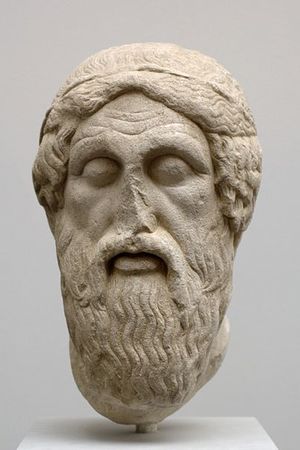Homer
Homer (Ancient Greek: Ὅμηρος) was an ancient Greek poet and the creator of the epic poems "Iliad" and "Odyssey." There is no information about his life, including the exact time he lived. The most common version places him in the 8th century BCE.
However, it is clear that the "Iliad" and the "Odyssey" were composed much later than the events they describe, before the 6th century BCE when their existence was reliably documented. The chronological period in which Homer's life is placed by modern scholars is approximately the 8th century BCE. According to Herodotus, Homer lived 400 years before him, indicating a date of 850 BCE. An unknown historian in his writings states that Homer lived 622 years before Xerxes, which would be around 1102 BCE. Other ancient sources claim that he lived during the time of the Trojan War. Currently, there are several proposed birth dates for Homer, each with its own supporting evidence.
The birthplace of Homer is unknown. According to an epigram by Callinus, seven cities disputed the honor of being his birthplace in ancient tradition: Smyrna, Chios, Colophon, Salamis, Rhodes, Argos, and Athens, and variations of the epigram also mention Cyme, Pylos, and Ithaca. Herodotus and Pausanias report that Homer died on the island of Ios in the Cyclades archipelago. It is likely that the "Iliad" and the "Odyssey" were composed on the coast of Asia Minor, inhabited by Ionian tribes, or on one of the neighboring islands. However, Homer's dialect does not provide exact information about his tribal affiliation, as it represents a combination of Ionian and Aeolian dialects of the ancient Greek language. There is a hypothesis that his dialect represents one of the forms of a poetic koiné that had formed long before the presumed time of Homer's life.
Traditionally, Homer is depicted as a blind poet. It is most likely that this representation does not stem from actual facts about his life but rather represents a reconstruction typical of ancient biographical genres. Additionally, one version of reading his name, "Homer," means "the one who does not see" (ὁ μῆ ὁρῶν). Since many outstanding legendary prophets and singers were blind (such as Tiresias), according to ancient logic associating prophetic and poetic gifts, the assumption of Homer's blindness appeared highly plausible. Furthermore, the poet Demodocus in the "Odyssey" is blind from birth, which could also be perceived as autobiographical.
There is a legend of a poetic contest between Homer and Hesiod, described in the work "Contest between Homer and Hesiod," created no later than the 3rd century BCE, and possibly much earlier according to many scholars. Allegedly, the poets met on the island of Euboea at the games in honor of the deceased Amphidemus and each recited their best verses. King Panedes acted as a judge in the competition and awarded the victory to Hesiod because his poetry called for agriculture and peace, rather than war and battles. However, the audience sympathized with Homer.
In addition to the "Iliad" and the "Odyssey," Homer is attributed to a number of works that were undoubtedly created later, such as "Homeric Hymns" (7th-5th centuries BCE, considered alongside Homer as the oldest examples of Greek poetry), the comic poem "Margites," and others. Byzantine scholars ascribed to Homer authorship of around twenty poems (including cyclic ones), as evidenced by the reworking of the "Iliad" by Constantine Rhomaios.
The meaning of the name "Homer" (which first appears in the 7th century BCE when Callinus of Ephesus named him as the author of the "Phocais") was also attempted to be explained in antiquity. Various interpretations were suggested, such as "hostage" (Gesichios), "follower" (Aristotle), or "blind man" (Ephorus of Cyme). However, all of these interpretations are as unconvincing as modern proposals to attribute the meaning of "poet" or "accompanist" to it. The word in its Ionian form, Ομηρος (Homeros), is almost certainly a real personal name.
Related topics
Ancient Greece, Men's clothing in Ancient Greece
Literature
- Russian prose translation: The Complete Works of Homer. Translated by G. Yanchevetsky. Revel, 1895. 482 p.
- Altman M. S. Survivals of the generic system in Homer's proper names. (Izvestiya GAIMK. Issue 124). Moscow-L.: OGIZ, 1936. 164 p. 1000 copies.
- Gordeziani R. V. Problemy gomerovskogo eposa [Problems of the Homeric Epic]. Tb.: Tbil Publishing House. univ., 1978. 394 p. 2000 copies.
- Zelinsky F. F. Gomerovskaya psikhologiya [Homeric psychology]. Pg., Publishing House of the Academy of Sciences, 1920.
- Koteneva A.V. Psychology in the epic poems of Homer. Concepts, phenomena, and mechanisms. — Saarbrücken: LAP LAMBERT Academic Publishing, 2016. ISBN 978-3-659-95960-8
- Lord A. Skazitel', Moscow, 1994.



